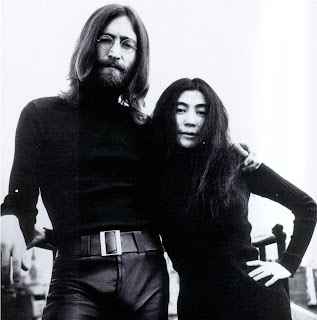 When someone gave me a box of discarded books recently, I pulled out one that caught my eye and began to read. The book was Cynthia Lennon's John, her 2005 personal expose of her ten year relationship with a legend.
When someone gave me a box of discarded books recently, I pulled out one that caught my eye and began to read. The book was Cynthia Lennon's John, her 2005 personal expose of her ten year relationship with a legend.I knew nothing about John Lennon's first wife...only that she existed. So much has been written about the Beatles and their relationships that to write more feels like adding a droplet of water to an already overflowing glass, not to mention the parasitic element of publicly raking over people's private lives. Yet Cynthia's book is interesting for its first-hand insights into the effects of fame, adulation, wealth and the problematic nature of creating cultural legends, alive or dead.
John is an unpretentious book, simply written and easy to plough through, if at times, a tad ordinary in execution: but then, this is not about slick literary style: it's about setting the record straight and laying bare some of the onion layers one of the most famous figures of the 20th century. There is a credulity about Cynthia's personality - a few times she alludes to ghosts, psychics and the mysterious power of numbers. This is not the mind of a sceptical, critical thinker. However, there's a compassion and emotional intelligence there that comes across in the writing, so that it feels like the truth, at least from the author's perspective. It's very human, though it is of course but one side of a very complex pancake.
Art and Love
 |
| John and Cynthia at art school |
Cynthia was with him through the Hamburg and Cavern years, the death of his closest friend, Stuart Sutcliffe, the fateful meeting with Brian Epstein, the unexpected and phenomenal success of The Beatles and all the craziness that went with it. As a Beatles wife she reaped some significant benefits - the celebrity friends, parties, the big house, the travel and the glamour but she was also left behind for long stretches. In those early years, the Beatles toured extensively, made a couple of films, had a host of commitments and were expected to churn out new recordings at a frantic pace every year.
Somewhere amid the making of the Beatles legend, things began to go awry for John and Cynthia. Always one for tasting new honeys, John started to get heavily into drugs, LSD in particular, which removed him for significant periods from any shared reality they might have had. John grew more distant and aloof and though his spiritual flirtation with the Maharishi temporarily stymied his drug habit, the relationship failed to improve. By then Yoko had appeared on the scene, a shadowy figure in the background at first but that was soon to change...
The Cruelty of John and Yoko
The disintegration of a marriage is rarely pretty but if Cynthia's account of the awful end-moment of her marriage to John Lennon is to be believed, and I see no reason why it shouldn't, John and Yoko's actions come across as unimaginably callous. It shocked me how impervious to another human's pain the couple appeared to be, especially John, who after all, had spent ten years of his life intimately living, loving, sharing and sleeping with the particular human in question. It was as though he were able to cauterise all feelings of empathy.That they were insensitive is putting it mildly.
It was, as Cynthia describes it, "an amputation" with a callous axe and no anaesthetic and even after the initial blow, the cuts continued, not just for Cynthia but for their son Julian as well. Post-separation, John and Yoko proved difficult to deal with - for months after the break-up it was difficult for Cynthia to even get to talk with John to make necessary arrangements about Julian, finances etc and when they did meet up it was always John with Yoko attached, never alone. The friction continued for years and while Julian did get to visit his father, it was only intermittently. From Julian's foreword to the book:
Dad was an idol to millions who grew up loving his music and his ideals. But to me he wasn't a musician or a peace icon, he was the father I loved and who let me down in so many ways. After the age of five, when my parents separated, I saw him only a handful of times and when I did he was often remote and intimidating. I grew up longing for more contact with him but felt rejected and unimportant in his life.
Cynthia puts forward some possible theories about John's behaviour and his attraction to Yoko: that John could only cope with hurtful situations by removing himself from them, that he saw in Yoko's domineering personality aspects of another Aunt Mimi, the woman who brought him up. Or perhaps that his own unusual upbringing and all the pain that it entailed - his father left when he was five and he was taken from his mother, had both hardened and damaged him in some fundamental way.
Passionate love is a mysterious thing, the obsessive compulsions of which are felt only by the lovers involved but sometimes leading to self-centredness and the obliteration of others. Whatever drove John Lennon to largely alienate himself from his first son and so completely sever himself from Cynthia, in favour of what seemed an exclusive, deep love and emotional dependence on Yoko Ono is, like all great love affairs, ultimately inexplicable.
"Said Sam to me
'tis a mystery
more deep than words can utter"~ The Magic Pudding
